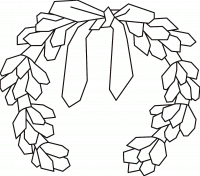
Summer 2021
(Jump to Fall 2020 or Spring 2021)
Primarily for Undergraduates
ARCH 0150 Introduction to Egyptian Archaeology and Art [CRN 60045]
An introductory survey of the archaeology, art and architecture of ancient Egypt, ranging in time from the prehistoric cultures of the Nile Valley through the period of Roman control. While the course will examine famous features and characters of ancient Egypt (pyramids, mummies, King Tut!), it will also provide a wide-ranging review of the archaeology of this remarkable land. Instructor: Laurel Bestock. MWF 11am-11:50am. Online.
ARCH 0353 Thunder-gods and Dragon-slayers: Mythology + Cultural Contact - Ancient Mediterranean and Near East (ASYR 0310) [CRN 60246]
Interested students must register for ASYR 0310.
This course is an exploration of the mythological imagination in the ancient Mediterranean and Near East. From cosmic origins to epic battles, mighty queens to baneful monsters, mythological motives and narratives crisscrossed the ancient world, bypassing seemingly rigid geographic and cultural boundaries. Particular attention will be devoted to the study of the dynamic reinterpretation of myths in situations of cultural contact. Primary evidence will include material from Mesopotamia, Egypt, Anatolia, the Levant, Greece and Rome. The course will span several millennia, from the earliest attestations of the Epic of Gilgamesh to the Christian and Muslim reinterpretation of so-called pagan myths. FYS.Instructor: Felipe Rojas. TTh 10:30am-11:50am.
ARCH 0424 Greek Mythology (CLAS 0900) [CRN 60054]
Interested students must register for CLAS 0900.
“What of these things goes now without disaster?” -Aeschylus, Agamemnon
This course is an introduction to Ancient Greek mythological traditions. Topics include: the Olympian gods; ‘culture heroes’ (e.g. Heracles), Homer and the Trojan Cycle of myths; mythical traditions about the families of Oedipus and Agamemnon; etc. We will conclude with an investigation of ancient mythical scholarship and skeptical views of myth in antiquity. Throughout we will be considering myth’s relationship with literature, visual culture, and religion. The class focuses on the ancient material (texts, images, monuments, rituals and traditions, etc.), with some secondary readings in mythological and cultural theory. Instructor: Johanna Hanink. Online.
ARCH 0428 War and Society: A Legacy of Ancient Greece? (CLAS 0650) [CRN 60089]
Interested students must register for CLAS 0650.
21st century society can no longer study the worlds of ancient Greece and Rome acritically. Today’s culture can be very accepting about the “culture of war” that was such a dominant aspect of the apogee of ancient Greek ‘civilization’: the 300 Spartans, the Athenian Empire, and the conquest of Persia, are all moments to which some turn in admiration. The exploitation of the martial culture today is a two-edged sword at least. This course explores the legacy of war, and violence, and its impact on our view of “civilization.” We will look at the key topics including Homer and warfare, Sparta, Persia, Athens’ Empire, Philip II and Alexander, violence in the Greek city, martial culture, exploitation, memory, and of course the 21st century legacy. Instructor: Graham Oliver. MWF 1pm-1:50pm.
ARCH 0679 The Ocean in Global History (HIST 0150J) [CRN 60345]
Interested students must register for HIST 0150J
This course plumbs the depths of the ocean's past to investigate how the planetary hydrosphere and its creatures have imprinted themselves upon the social, political, and cultural character of diverse human communities as sources of sustenance and power, cosmology and knowledge, conveyance and death. Topics to be considered include Austronesian seafaring traditions in the ancient Indo-Pacific; maritime empires, piracy and human trafficking in the age of sail; industrial fisheries and the establishment of oceanography as a scholarly discipline; and the political ecology of a warming ocean in the era of climate crisis. Instructor: Gabriel Rocha. MW 8:30am-9:50am Course offered online.
For Undergraduates and Graduates
ARCH 1168 Decolonization, History, Art, Museums and Curation (AFRI 1045) [CRN 60392]
Interested students must register for AFRI 1045
Over the past few years there have been calls for decolonization of art and museums. But what do these calls mean? There are now claims for reparations of art objects and in ethnographic museums human remains. The decolonization call has foregrounded the colonial origins of many of the world’s leading museums and called into question curatorial practices. It asks us to think about art and exhibition histories and the present narratives about the making of the modern museum. This course will examine these issues as well as attempts to reimagine museums. Issues of curatorial practices of historical and art exhibitions will be reviewed. Curators and artists from Africa, Europe and USA will deliver in class lectures and lead discussions. Undergraduate seminar. Graduate students are welcome. Instructor: Barrymore Bogues. W 3pm-5:30pm.
ARCH 1887 Illustrating Knowledge (HIAA 1101A) [CRN 60284]
Interested students must register for HIAA 1101A.
This seminar will investigate the history of illustration from the first manuscript maps and printed herbals to the present, including paintings, photographs, and computer imaging. We will investigate the role of pictures in the exchange of scientific ideas, and modes of representation developed in both the arts and the sciences. Enrollment limited to 19 first year students. Instructor: Evelyn Lincoln. W 3pm-5:30pm.
ARCH 1892 Books, Material and Digital (AMST 1906L) [CRN 60370]
Interested students must register for AMST 1906L.
This course considers books as material objects, cultural artifacts, and as information. We will make paper and print with the hand press, and read about skills and materiality, to understand books as objects. Descriptive bibliography helps us understand books as cultural artifacts in libraries, and we will consider the cultures of collecting and cataloging and reading. Increasing, books are used in digital formats, depending on new kinds of technology and labor, and offering new and different kinds of access. How do libraries and scholars consider and take advantage of both materiality and digitality in their collection, preservation, and use of books? Instructor: Steven Lubar. TTh 10:30am-11:50am.
ARCH 1900 The Archaeology of College Hill [CRN 60046]
A training class in field and laboratory techniques. Topics include the nature of field archaeology, excavation and survey methodologies, archaeological ethics, computer technologies (such as GIS), and site and artifact analysis and conservation. Students will act as practicing archaeologists through the investigation of local historical and archaeological sites in the College Hill area (e.g. the First Baptist Church of America and the John Brown House). Instructor: Anna Soifer. W 3pm-5:30pm.
Fall 2020
(Jump to Spring 2021 or Summer 2021)
Primarily for Undergraduates
ARCH 0033 Past Forward: Discovering Anthropological Archaeology (ANTH 0500) [CRN: 16480]
Interested students must register for ANTH 0500.
This course offers a broad journey through the human past, from material culture crafted by our evolutionary ancestors to the remnants of the recent historic past. To facilitate this journey, the class explores the methods, concepts, and theories that anthropologists employ in the study of past peoples, places, and things. Case studies stretch across the globe. As a hands-on endeavor, archaeology focuses on tangible evidence. In this course, small-group discussion, laboratory, and field exercises will complement lectures, leading to an understanding of how anthropologists study the past and how that knowledge affects the present. LILE. Instructor: Parker Van Valkenburgh. MWF 10am-10:50am.
ARCH 0524 Art and Architecture of the Roman Empire (HIAA 0032) [CRN: 17623]
Interested students must register for HIAA 0032.
How did a small city in central Italy grow to become one of the most powerful empires in history? This course explores the art and architecture produced in ancient Rome from its origins in the 6th century BCE to the fourth century CE. It considers a wide variety of media, including reliefs, freestanding sculpture, architectural monuments, mosaics, wall paintings, and daily-life objets. By exploring the role of art and architecture in the formation and expansion of the Empire, considering the experiences of ancient viewers, the course offers a post-colonial reading of ancient Roman history and culture. DIAP. (A) Instructor: Gretel Rodriguez. Online.
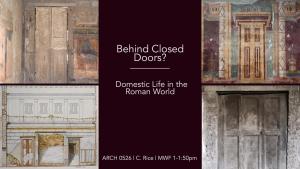 ARCH 0526 Behind Closed Doors? Domestic Life in the Roman World [CRN: 18376] [Course Website]
ARCH 0526 Behind Closed Doors? Domestic Life in the Roman World [CRN: 18376] [Course Website]
This course explores the archaeological remains of domestic life across the Roman world from Pompeii to Britain to Syria and attempts to reconstruct the private lives of Romans, particularly the women, children, servants, and slaves who were less visible in more public spheres. We will consider the methodological complexities of interpreting artifact assemblages and reflect on our own houses and notions of private lives both as sources of inspiration and stumbling blocks for understanding Roman domestic life as we open doors and re-people Roman houses. Instructor: Candace Rice. MWF 1pm-1:50pm. Online.
For Undergraduates and Graduates
ARCH 1108 Politics and Spectacle in the Arts of Ancient Rome (HIAA 1307) [CRN: 15733]
Interested students must register for HIAA 1307.
This seminar investigates the intersection of politics and spectacles in the artistic production of ancient Rome. We will explore a variety of public monuments to reveal how they codify essential aspects of Roman culture. Topics include the architecture of entertainment spaces such as theaters, amphitheaters, and circuses, as well as the social functions of spectacles such as gladiatorial games and triumphal processions. We will look at expressions of imperial propaganda in monuments such as tombs and honorific arches. The class also considers how these ideas entered the private realm in the form of domestic wall paintings, mosaics, and sculpture gardens. A. Instructor: Gretel Rodriguez. W 3pm-5:30pm.
ARCH 1162 Anthropology in/of the Museum (ANTH 1901) [CRN: 16493]
Interested students must register for ANTH 1901.
This course will provide an introduction to the history, purposes, transformations, and internal workings of museums from an anthropological perspective. Students will learn about museums that focus on natural and cultural history related to anthropological studies of archaeology, human evolution, and world ethnography. It will cover the relevance of anthropological training to careers in the museum field, as well as the importance of conducting anthropological investigations in the museum environment. Enrollment limited to 20. Instructor: Robert Preucel. F 3pm-5:30pm.
ARCH 1237 Pre-Columbian Art and Architecture: A World That Matters (ANTH 1030) [CRN: 17386]
Interested students must register for ANTH 1030.
Survey of ancient art and building in ancient America, with a focus on Mexico, Central America, and the Andes. Underlying concepts include: meaning and method, cosmos and kingship, narrative and symbol, personality and authorship, empire and royal court. Rich collections of the Haffenreffer museum will form the focus of work in the class. DPLL LILE. Instructor: Stephen Houston. TTh 10:30am-11:50am.
ARCH 1283 The Fragility of Life in Ancient Greece (CLAS 1130) [CRN: 17127]
Interested students must register for CLAS 1130.
This interdisciplinary course explores the fragility of life in the Ancient Greek city-state form multiple perspectives: those of state-building, the population stress in the city, the capacity for the family to maintain and sustain itself, to those of the individual: man, woman, and child, whose life experiences left them vulnerable to disease and economic hardship. This course explores Ancient Greek socio-economic history addressing health, disease, fertility and childbirth, migration, mobility, and population and family ‘management’ as well as topics fundamental to historical demography (mortality, birth rates, and growth) over the longue durée approach (Archaic through Roman Imperial eras). Instructor: Graham Oliver. TTh 2:30pm-3:50pm.
ARCH 1486 The Bureaucracy of Hell: Envisioning Death in East Asian Art (HIAA 1213) [CRN: 17278]
Interested students must register for HIAA 1213.
This seminar examines the material and visual cultures of death in premodern East Asia. Topics include the materiality of funerary rites, the practice of entombing the dead with miniatures, and the visual tradition associated with the influential Scripture on the Ten Kings, which envisioned the afterlife as an infernal bureaucracy. We will discover that the way people in premodern East Asia envisioned death had a lot to do with the way in which they experienced life. By thinking through the continuities, we will use the present traces of death to envision the absent world of the living. Instructor: Jeffrey Moser. Online, with Zoom sessions Th 5pm-6:30pm EST.
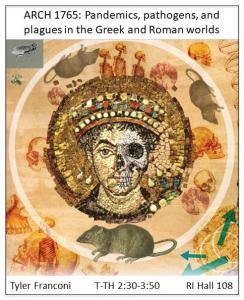 ARCH 1765 Pandemics, Pathogens, and Plagues in the Greek and Roman Worlds [CRN: 17531] [Course Website]
ARCH 1765 Pandemics, Pathogens, and Plagues in the Greek and Roman Worlds [CRN: 17531] [Course Website]
Terror of mass illness is nothing new; as long as there have been humans, there has been disease. These pandemics and plagues have had mortal impacts on past societies, much as contemporary plagues affect today’s economies, social and political structures, and populations. This class considers disease and society in the ancient Greek and Roman worlds, beginning with the Plague of Athens in 430 BC and continuing to the outbreak of the ‘first pandemic’ of bubonic plague in AD 541. We will examine these case studies through archaeological material, written accounts, DNA analysis, palaeoclimate reconstruction, and palaeopathology. Instructor: Tyler Franconi. TTh 2:30pm-4:00pm.
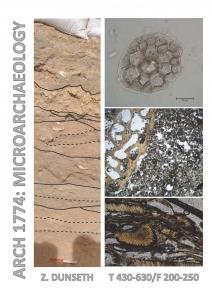 ARCH 1774 Microarchaeology [CRN: 17601] [Course Website]
ARCH 1774 Microarchaeology [CRN: 17601] [Course Website]
Sediment – informally called ‘dirt’ or ‘soils’ – is a rich source of untapped information on ancient natural, animal, and human activity: the foundations of microarchaeology. This course will introduce students to key microarchaeological concepts including site-formation processes, human-environmental interactions, and chemical and microremain assemblages. Case studies will include the geoarchaeological fingerprints of destruction; lifeways in cave shelters, pastoral encampments, and urban households; origins of agriculture and use of fire; and – everyone’s favorite topic – what can be learned from human and animal excrement. Hands-on archaeological experiments, field collection, and laboratory methods will be introduced. Instructor: Zachary Dunseth. T 4pm-6:30pm, and F 12pm-12:50pm. Online.
ARCH 1874 The Anthropocene: The Past and Present of Environmental Change (ENVS 1910) [CRN: 16807] [Course Website]
Interested students must register for ENVS 1910.
Scholars in many disciplines have begun using the term the Anthropocene to signal a geological epoch defined by human activity. This seminar examines the Anthropocene idea from the perspective of environmental history. What activities might have changed the planet – the use of fire thousands of years ago, or agriculture, or fossil fuels? Is the Anthropocene another term for climate change, or does it include pollution and extinction? Is it a useful concept? Drawing on anthropology and the sciences as well as history, we will use the Anthropocene to think through environmental change and the human relationship with the non-human world. WRIT. Instructor: Bathsheba Demuth. Th 4pm-6:30pm.
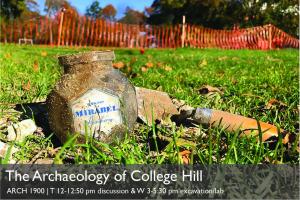 ARCH 1900 The Archaeology of College Hill [Course Website]
ARCH 1900 The Archaeology of College Hill [Course Website]
CANCELED - We have made the difficult decision to postpone this course until Summer 2021, and hope to offer it in Fall 2021, as well.
A training class in field and laboratory techniques. Topics include the nature of field archaeology, excavation and survey methodologies, archaeological ethics, computer technologies (such as GIS), and site and artifact analysis and conservation. Students will act as practicing archaeologists through the investigation of local historical and archaeological sites in the College Hill area (e.g. the First Baptist Church of America and the John Brown House).
Primarily for Graduates
ARCH 2006 Principles of Archaeology (ANTH 2501) [CRN: 16483]
Interested students must register for ANTH 2501.
Examines theoretical and methodological issues in anthropological archaeology. Attention is given to past concerns, current debates, and future directions of archaeology in the social sciences. Instructor: Stephen Houston. M 3pm-5:30pm.
ARCH 2177 Reframing Medieval Art (HIAA 2440F) [CRN: 17437]
Interested students must register for HIAA 2440F.
The seminar will look critically at the history of medieval art and architecture. We will examine the voices of past scholarship, and the ways in which topics like cultural contact, race, and the movements (forced and unforced) of people and objects have been handled. Each student will construct a syllabus that develops new pedagogic strategies for teaching medieval art and architecture in a global and postcolonial context. Instructor: Sheila Bonde. Online.
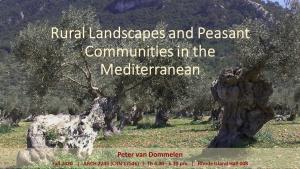 ARCH 2245 Rural Landscapes and Peasant Communities in the Mediterranean [CRN: 17546] [Course Website]
ARCH 2245 Rural Landscapes and Peasant Communities in the Mediterranean [CRN: 17546] [Course Website]
The broad aim of this course is to explore rural settlement and agrarian production in the Mediterranean, both in the ancient and the recent past. The archaeological starting-point is provided by the numerous scatters of surface remains that archaeological surveys across the Mediterranean have collected and that are usually interpreted as 'farmsteads' broadly datable to Classical Antiquity. We will look well beyond these scatters to examine the social and economic significance of rural settlement through comparison with ethnographic and historical rural studies from across the Mediterranean and to explore household and community organisation as well as agrarian production in Classical Antiquity. Instructor: Peter van Dommelen. Th 4pm-6:30pm.
ARCH 2557 Critical Approaches to Architectural Preservation and Cultural Heritage (AMST 2685) [CRN: 17358]
Interested students must register for AMST 2685.
This course examines the modern fields of preservation and cultural heritage from a historical and critical point of view to better understand their formation, evolution, current condition and the issues integral to their future. We explore such thorny topics as the “invention” of tradition and the relationship between heritage programs and nationalism, the evolution of the global cultural heritage industry, the story of preservation institutions in the United States and abroad, the rise of cultural heritage crimes in conflict zones, public history and memorials at “sites of conscience,” and the emergence of digital preservation and “experimental preservation.” Instructor: Marisa Brown. TTh 2:30pm-3:50pm.
ARCH 2558 Methods in Public Humanities (AMST 2540) [CRN: 15740]
Interested students must register for AMST 2540.
This course surveys public humanities work, including cultural heritage preservation and interpretation, museum collecting and exhibition, informal education, and cultural development. It also provides an overview of the contexts of that work in nonprofit organizations, including governance, management, and development. Instructor: Steven Lubar. TTh 10:30am-11:50am. Online.
 ARCH 2710 The Archaeology of Nubia and Egypt [CRN: 18027] [Course Website]
ARCH 2710 The Archaeology of Nubia and Egypt [CRN: 18027] [Course Website]
Egypt and Nubia share the distinction of ancient civilizations along the Nile river, but Nubia remains much more poorly known than Egypt. This seminar will examine the archaeology of Nubia, including its relationship to Egypt, from the introduction of ceramics and agriculture to the medieval period. This long-term perspective will allow comparative study of issues such as state formation, imperialism and religious change. Instructor: Laurel Bestock. W 3pm-5:30pm. Online.
Spring 2021
(Jump to Fall 2020 or Summer 2021)
Primarily for Undergraduates
ARCH 0201 Sport in the Ancient Greek World (CLAS 0210 O) [CRN: 26612] [Course Website]
Interested students must register for CLAS 0210O.
Athletics and sports were as popular and significant in the ancient Greek world as they are today, and so offer an excellent introduction to its archaeology and history. This class will discuss the development of Greek athletics, the nature of individual events, the social implications of athletic professionalism, women and athletics, and the role of sport in Greek education. Instructor: John F. Cherry. MWF 11am-11:50am.
ARCH 0372 Meeting with Mesopotamia [CRN: 27312]
This is a class about first impressions. Since the 19th century, excavations in and around Iraq have provided us with significant finds that both enlighten us and challenge us with new insights on life in the ancient world. Using some of these finds, such as the Code of Hammurabi and the Cyrus Cylinder, this class will explore thousands of years of Iraq’s culture, power relations, religion, and science. We will also discuss how these finds have been used and abused in modern contexts, and how our own experiences color our understanding of their world. FYS. Instructor: Zachary Rubin. TTh 9am-10:20am.
ARCH 0528 Living on the Edge: Communities of the Roman Frontier [CRN: 27090] [Course Website]
The Roman Empire was surrounded by over 3,100 miles of frontier that marked the end of Roman territory. These regions are often discussed solely from a military standpoint, but soldiers were only a small part of a much larger frontier community that included women and children, locals and foreigners, and Romans and non-Romans. This course explores how these communities, often marked by asymmetrical power relationships between the Roman State and local communities, developed, investigating social structures, religion, art and architecture, and economies in order to understand what it was like to live on the edge of the Roman world. Instructor: Tyler Franconi. MWF 1pm-1:50pm.
ARCH 0643 The Architectures of Islam (HIAA 0041) [CRN: 24488]
Interested students must register for HIAA 0041.
Through selected case study examples, the course examines the varied manifestations of Islamic architectures. The course spans fourteen centuries and three continents, and examines religious as well as secular buildings. We will trace the sources and 'invention' of Islamic architecture in the Umayyad dynasty of the seventh and eighth centuries, and will explore its varied manifestations up to the contemporary period. By examining cross-cultural and trans-regional interactions, we will also investigate the relationship between Islamic and non-Islamic architectural traditions. A WRIT. Instructor: Sheila Bonde. MWF 12pm-12:50pm.
ARCH 0676 Pirates of the Caribbean: Scalawags, Sailors, and Slaves [CRN: 27212] [Course Website]
Avast ye maties! Study the legendary bandits, mischievous scalawags, and barbarous buccaneers that roved the high seas of the Caribbean from the sixteenth to the eighteenth century. Through archaeological and historical scholarship, we will explore pirates’ everyday belongings, the goods they plundered, the hideaways they called home, the havoc they caused, and the legends they left behind -- including Blackbeard, Captain Morgan, and even Captain Jack Sparrow. We will also investigate the economics behind the rise of piracy, with an emphasis on the trans-Atlantic slave trade. Instructor: Miriam Rothenberg. MWF 10am-10:50am.
ARCH 0763 The Private Life of the Privy: A Secret History of Toilets [CRN: 25815] [Course Website]
It’s usually unspoken, but we all know the truth: everybody poops. This class starts with some basic questions: what is poo; what are toilets, cesspits, and latrines; and how have these changed over time. But where we go, what "equipment" we use, what goes into the loo, and the morals and ideals imbued in that act vary vastly between cultures – touching on complex questions of gender, religion, disease, technology, and science. Combining advanced scientific approaches with material and cultural analyses, this course will demonstrate that even a seemingly simple biological act can reveal a culture’s most fundamental secrets. Instructor: Zachary Dunseth. MWF 2pm-2:50pm.
For Undergraduates and Graduates
ARCH 1025 Greece-Egypt-Anatolia-Mesopotamia: Transcultural Interactions in the Ancient World [CRN: 26097] [Course Website]
The ancient Mediterranean and Near East were intensely interconnected: myth, art, materials, technologies, and political institutions flowed between Mesopotamia, Egypt, Anatolia, Greece, and beyond. For as long as those flows have existed, there have also been complex and protracted reflections about their directions, causes, and consequences. This class takes a long-term, cross-cultural perspective to study both ancient (e.g, Herodotus, Manetho, Berossus) and modern discourses (e.g., Bernal, Burkert, Broodbank) about the dynamics of such transcultural interactions and the changing political stakes of the debate. Instructor: Felipe Rojas. TTh 10:30am-11:50am.
ARCH 1054 Indians, Colonists, and Africans in New England (ANTH 1624) [CRN: 25769]
Interested students must register for ANTH 1624.
The course explores the colonial and capitalist transformation of New England's social and cultural landscapes following European contact. Using archaeology as critical evidence, we will examine claims about conquest, Indian Extinction, and class, gender and race relations by studying the daily lives and interactions of the area's diverse Native American, African American, and European peoples. Instructor: Patricia Rubertone. TTh 2:30pm-3:50pm.
ARCH 1233 Ancient Maya Writing (ANTH 1650) [CRN: 25751]
Interested students must register for ANTH 1650.
Nature and content of Mayan hieroglyphic writing, from 100 to 1600 CE. Methods of decipherment, introduction to textual study, and application to interpretations of Mayan language, imagery, world view, and society. Literacy and Mesoamerican background of script. Instructor: Stephen Houston. MWF 1pm-1:50pm.
ARCH 1235 Vertical Civilization: South American Archaeology from Monte Verde to the Inkas (ANTH 1505) [CRN: 25809]
Interested students must register for ANTH 1505.
This course offers an introduction to the archaeology of indigenous south American Civilizations, from the peopling of the continent around 13,000 years ago, to the Spanish Invasion of the 16th Century C.E. Throughout, we seek to understand the often unique solutions that South America indigenous peoples developed to deal with risk and to make sense of the world around them. Course lectures and discussions focus on recent research and major debates. Weekly sections draw on viewings of artifacts and manuscripts from the Haffenreffer Museum and the John Carter Brown Library. DPLL LILE. Instructor: Parker VanValkenburgh. TTh 2:30pm-3:50pm.
ARCH 1574 Merchants, Trade, and Commerce in the Roman World (CLAS 1441) [CRN: 25728] [Course Website]
Interested students must register for CLAS 1441.
Exotic spices, fermented fish sauce, mass-produced pottery, olive oil, fine wine, not so-fine wine, marble, bricks, metals, people, art, elephants – these are just a few of the things that the Romans traded. This course draws on archaeological, literary, and epigraphic material to investigate the world of Roman trade from the goods that were moved, to the logistics of transport, to the merchants and traders themselves. Who ventured to India in search of spices? Who ran the local wine shop? How were colossal columns transported across deserts? Instructor: Candace Rice. TTh 2:30pm-3:50pm.
ARCH 1708 Sacred Sites: Law, Politics, Religion (RELS 1610) [CRN: 25010]
Interested students must register for RELS 1610.
Sacred sites have long been flashpoints for inter-communal conflict the world over, as well as posing challenges to sovereign State authority. Such sites range from natural landscapes to architectural masterpieces. They often come to symbolize the perennial clash between the religious and the secular, the sacred and the political, tradition and modernity. We will discuss a diverse array of specific disputes and ask whether one may even speak of “sacred sites” cross-culturally. Can legal frameworks embrace different notions of the sacred? We will also examine the historical contexts that provoke such disputes, particularly the aftermath of colonialism. Instructor: Nathaniel Berman. W 3pm-5:30pm.
ARCH 1712 Ruins: Cross-cultural Understandings of the Material Traces of the Past [CRN: 26596] [Course Website]
What is a ruin? How, when, and why does something become a ruin? What sorts of ruins (e.g., nuclear, digital, biological) are we leaving behind us? This class probes the widely varied understandings of the relationship between time and matter that inform people’s ideas about the traces of the past. And it surveys how people across the globe and in many time-periods – from ancient China and Greece, to the early Americas and Islamic Arabia – have explained their own and others’ historical, ethical, aesthetic, and emotional connections to those traces. Instructor: Felipe Rojas. TTh 1pm-2:20pm.
ARCH 1769 Unearthing the Body: History, Archaeology, and Biology at the End of Antiquity (HIST 1835A) [CRN: 24612]
Interested students must register for HIST 1835A.
How was the physical human body imagined, understood, and treated in life and death in the late ancient Mediterranean world? Drawing on evidence from written sources, artistic representations, and archaeological excavations, this class will explore this question by interweaving thematic lectures and student analysis of topics including disease and medicine, famine, asceticism, personal adornment and ideals of beauty, suffering, slavery, and the boundaries between the visible world and the afterlife, in order to understand and interpret the experiences of women, men, and children who lived as individuals—and not just as abstractions—at the end of antiquity. Instructor: Jonathan Conant. MWF 12pm-12:50pm.
ARCH 1793 Slavery in the Ancient World (CLAS 1120E) [CRN: 25449]
Interested students must register for CLAS 1120E.
Examines the institution of slavery in the ancient world, from Mesopotamia and the Near East to the great slave societies of classical Greece and (especially) imperial Rome; comparison of ancient and modern slave systems; modern views of ancient slavery from Adam Smith to Hume to Marx to M.I. Finley. Readings in English. Instructor: John Bodel. TTh 10:30am-11:50am.
ARCH 1822 Anthropology of Place (ANTH 1910B) [CRN: 25780]
Interested students must register for ANTH 1910B.
The anthropology of place serves as a unifying theme for the seminar by bridging anthropology’s subdisciplines and articulating with other fields of knowledge. Through readings and discussion, students will explore how place permeates people’s everyday lives and their engagement with the world, and is implicit in the meanings they attach to specific locales, their struggles over them, and the longings they express for them in rapidly changing and reconfigured landscapes. Instructor: Patricia Rubertone. Th 4pm-6:30pm.
ARCH 1875 Sustainability - Past and Present [CRN: 27313] [Course Website]
Our daily lives -- and our national politics -- are increasingly impacted by both fears and effects of global warming and climate change. However, ours is not the first society that has struggled with issues of conservation, governance, infrastructure, and resilience. This course will introduce students to the social and ecological challenges of sustainability, past and present, through the lenses of archaeology and political ecology -- including scientific, technological, and social strategies. This includes asking, "sustainable for whom?" -- who benefits from (or is harmed by) environmental policies and transformations? Instructor: Kathryn Catlin. TTh 1pm-2:20pm.
ARCH 1881 An Introduction to GIS and Spatial Analysis for Anthropologists and Archaeologists (ANTH 1201) [CRN: 25755]
Interested students must register for ANTH 1201.
This course serves as an introduction to the concepts, techniques, and (to a lesser extent, the histories) that motivate geographic information systems and their employment in anthropological and archaeological scholarship. GIS brings together traditional cartographic principles, computer-assisted analytical cartography, relational database design, and digital image processing and analysis to enable people to develop geospatial databases, analyze those databases, and use maps and other visual representations as part of this analysis. No previous work in GIS or computer programming is necessary. Previous computer experience with MS Windows operating systems is helpful. DPLL LILE. Instructor: Parker VanValkenburgh. TTh 10:30am-11:50am.
Primarily for Graduates
ARCH 2176 The World of Late Antiquity (CLAS 2100G) [CRN: 25810]
Interested students must register for CLAS 2100G.
Focused on the Mediterranean world between the third and ninth centuries CE, this seminar introduces students to the study of late antiquity and the early middle ages from a multidisciplinary perspective. Class sessions focus on the intensive reading of a small collection of closely-related primary sources in the original language and contextualizing them through a grounding in other disciplines essential to the study of ancient and medieval history, including archaeology, codicology, palaeography, numismatics, and prosopography. Topics vary by semester and may include such themes as the body, emotional and psychological histories, trauma, slavery, violence, “barbarians,” or interfaith interaction. Prerequisite: Latin. Instructor: Jonathan Conant. M 3pm-5:30pm.
ARCH 2228 Prosperity in Antiquity [CRN: 26597] [Course Website]
What did it mean to be prosperous in antiquity, and how do we identify this in the archaeological record? What methodologies can we use to conceptualize and evaluate privilege in the ancient world? This course investigates material evidence for prosperity at individual, community, and state levels, seeking to understand how lives were affected by broader societal prosperity. We’ll address questions of inequality, explore the impact of technological developments, and consider how literacy, art, and entertainment contributed to a different quality of life for the wealthy. Instructor: Candace Rice. W 3pm-5:30pm.
ARCH 2240 Key Issues in Mediterranean Prehistory [CRN: 26598] [Course Website]
This course's scope is the entire Mediterranean basin, from its first peopling until ca. 500 BC. The focus is on key transformations in economic, social, and political structures and interactions; on explanations for these changes; and on current issues where fresh data or new approaches are transforming our understanding. This seminar is intended for students both with and without prior knowledge of this field, and particularly for those preparing for the Mediterranean Prehistory field exam. Instructor: John F. Cherry. Th 2:30pm-5pm.
ARCH 2553 Introduction to Public Humanities (AMST 2650) [CRN: 24737]
Interested students must register for AMST 2650.
This class, a foundational course for the MA in Public Humanities with preference given to American Studies graduate students, will address the theoretical bases of the public humanities, including topics of history and memory, museums and memorials, the roles of expertise and experience, community cultural development, and material culture. Enrollment limited to 20 graduate students. Instructor: Monica Martinez. M 3pm-5:30pm.
Please Note: This schedule may be updated to reflect guidance provided Brown University's administration.
Additional Course Information
You may also visit Courses@Brown listings for up-to-date information on courses and room assignments. Check under: Area of Study: "Archaeology and the Ancient World”
For a listing of all courses ever taught in Archaeology and the Ancient World (or in Old World Archaeology, its predecessor), please visit the "All Courses" page on this website. To browse the web pages and Canvas sites -- including syllabi -- for most ARCH courses, please see our "Course Websites" page.
